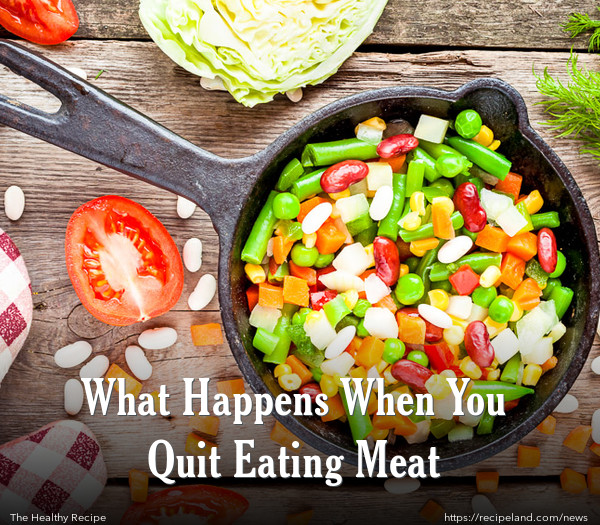Have you ever considered switching to a vegetarian or plant-based diet? If so, you probably know some of the health benefits that you will enjoy. But, here are 6 great things that can happen when you cut meat out of your diet.
1. Weight Loss
A recent study published in the Journal of the Academy of Nutrition and Dietetics concluded that those who focus on eating more greens, and less meat, can lose more weight than those who include meat regularly in their diet. Studies suggest you can lose 7 pounds, just by switching to a vegetarian diet. The longer you stay on the vegetarian diet, the more you stand to lose.
2. Healthier Gut
As your body produces the digestive enzymes responsible for processing meat, you can experience some good changes. While you may initially feel bloated as your gut bacteria adjusts, eating more plant-based foods can soon help to boost the healthy bacteria and lead to more efficient digestion. You will feel better when your body adjusts to the new plan. As your gut bacteria improves, you reduce your risk of developing many chronic diseases, and your waistline will thank you, too.
3. Reduced Risk of Heart Disease
There have been many studies, some with more than 75,000 participants, that have compared the risk of developing heart disease for carnivores and vegetarians. The risk of developing ischemic heart disease (caused by narrowing of the arteries due to cholesterol and plaque buildup) is reduced by nearly 25% for plant eaters. Emily Bailey, R.D., the director of nutrition coaching, sports nutrition, eating disorders and weight management at NutriFormance in St. Louis, states, “Plant-based diets have been proved time and again to be anti-inflammatory.” This helps your heart stay healthy!
4. Taste Buds May Change
Eating lots of plant-based foods will change how foods taste. Meat is high in zinc, which is thought to be connected to taste and hearing. Vegetarians needs to ensure that they are getting enough dietary zinc to protect taste buds and hearing. Zinc is also important for the immune system. Joan Salge Blake, R.D., a clinical associate professor of nutrition at Boston University, stated, “We hypothesize that patients with taste impairment may have malabsorption of dietary zinc.” Vegetarians should aim to increase their intake of whole grains, beans, nuts, and dairy products to make sure they are getting the recommended daily amounts. For women, this means getting at least 8 milligrams, but getting 12 is even better.
5. Increased Muscle Recovery Time
Because protein is so important for muscle recovery, vegetarians need to make sure that they are getting enough protein when not eating meat. Bailey states, “Knowing that, I recommend vegetarian athletes and vegan athletes in particular get their post-workout protein in liquid form, since liquids are absorbed more quickly into the body than solids. Make a smoothie with coconut milk, almond milk, hemp milk, rice milk, or soy milk, and add carbohydrates in the form of fresh fruit to replenish your glycogen stores, which your body uses for energy post-workout.”
6. Supplements May Be Required
Although some studies suggest that vegetarians can get as much protein as carnivores, they have to pay more attention to their sources to ensure amounts are sufficient. Supplementing with vitamin B12 and calcium can help the body absorb proteins better.
If you have been considering trying a vegetarian diet, know these simple facts before you get started so that you can get the most out of your diet and experience the healthy benefits that come with a plant-based diet.










Comments